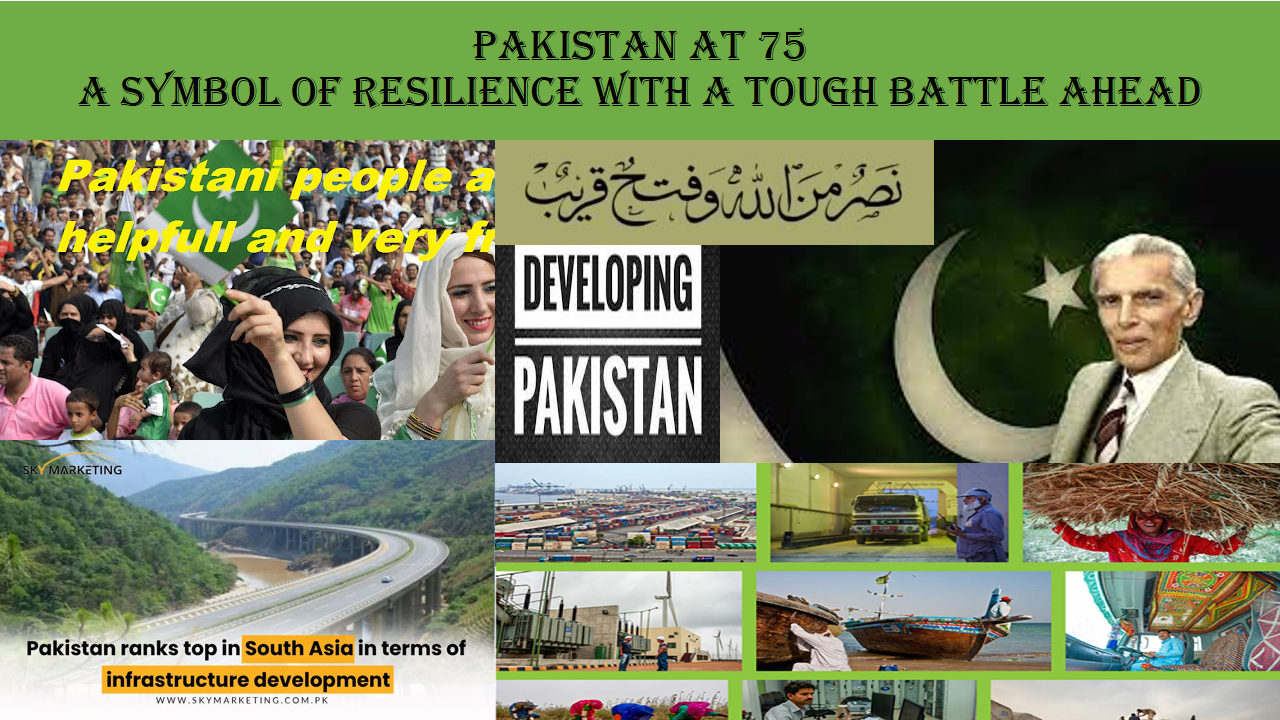The Islamic Republic of Pakistan stands tall at 75 after its independence from British India on 14 August 1947 facing a tougher battle ahead. Pakistan is now the fifth largest country with 220 million people of which nearly 65% are below the age of 35. In view of its immense strategic relevance in the region, Pakistan has large standing armed forces, with nuclear capability to maintain cross-domain deterrence to ensure territorial integrity against a five times larger adversary, India.
Pakistan’s history is replete with moments of internal and external crises and conflicts. No sooner did the country come into being as the world’s largest Muslim state, it faced an unjust distribution of resources and did not get its due share as per the Partition Plan. Similarly, the Boundary Commission, headed by Sir Cyril Radcliffe, failed to do justice and succumbed to the pressure of Indian leaders and hence, wrongfully awarded the District of Gurdaspur to India instead of Pakistan. This particular award gave direct access to the Indian military into Jammu and Kashmir and gave an upper hand to India over Pakistan when the two nations went to war over the territory. The people of now Indian Occupied Jammu and Kashmir (IIOJK) were denied the Rights of Self-determination by India despite numerous United Nations Security Council Resolutions, and the dispute remains on the UN Agenda even after 75 years.
The Pakistani nation has shown resilience in many other crises and conflicts over the last 75 years of its existence. While the Kashmir conundrum continues, Siachen and Sir Creek disputes have also not been resolved between the arch-rivals.
The low point in Pakistan’s short history came when the India-supported insurgency led to the creation of Bangladesh out of East Pakistan in December 1971. However, the people of Pakistan absorbed the shock and moved on to become a nuclear weapon state to thwart any existential threat.
No sooner did the country come into being as the world’s largest Muslim state, it faced an unjust distribution of resources.
In the domain of diplomacy, Pakistan suffered numerous setbacks when its Cold War ally, the United States (US) imposed military and economic sanctions soon after the 1965 war with India. The on and off relationship with the US continues even today, and Pakistan remains a potential target of its discriminatory policies on matters related to regional affairs.
In spite of these difficulties, Pakistan plays an active role in global politics due to its strategic location at the mouth of the warm waters of the Arabian Sea. The strategic port of Gwadar is being developed by China, as its transnational shipment point for which a China-Pakistan Economic Corridor (CPEC) is being built with Chinese investment and loans, as part of China’s Belt and Road Initiative (BRI). It is widely expected that the many Central Asian States, along with Russia will join CPEC, once peace and normalcy return to Afghanistan under the new setup.
Pakistan’s economy is highly vulnerable to international shocks due to ever-widening external debts, and its dependence on foreign assistance to manage the Balance of Payments. Unfortunately, lack of emphasis on indigenisation and low priority given to industrialisation in the last three decades has led to heavy dependence on imported goods and services, which has caused serious current account deficit to as high as USD 20 billion in 2018; and which is now hovering at USD 9 billion.
Moreover, in spite of being an agricultural state due to abundance of land, water, favourable climate and an extremely hard-working rural population, Pakistan has failed to become a major exporter of value-added agricultural produce. Rather, it occasionally needs to import wheat, sugar, and cotton to meet local demand.
The four-decade-long wars and conflicts in Afghanistan have also had a toll on Pakistan’s economy and security, both internally and externally. Pakistan remained a prime target of the Soviet Union during the 1980s when it was supporting the Afghan struggle against Soviet occupation, whereas it became a target of Non-State Actors (NSAs) during US-NATO War on Terror in the post-9/11 environment. Pakistan has suffered immensely on account of the sociocultural and ideological aspects, urban development, civic facilities due to the exodus of refugees, and guns and drugs inflow along with them. Therefore, it is no surprise that Pakistan is leading the call for sustainable peace and development in Afghanistan now that the US and NATO forces have left the war-ravaged country.
While Pakistan may have become a nuclear weapon state, it has fared very poorly in the Human Development Index (HDI). It ranks at the bottom of nearly all major parameters of HDI, as well as on the Corruption Perceptions Index (CPI), judiciary performance, passport ratings, and travel safety standards. This means that a lot needs to be done to convert this attribute of resilience into substantial development of its human resource which is extremely hard working and enterprising. All we need is to set the priorities right and that can be done by carrying out a dispassionate appraisal of the seven-plus decades and set pragmatic targets for the next 25 years. I have no doubt that given the right vision and leadership, this nation will rise to its true potential much sooner than anticipated.
Dr Zia Ul Haque Shamsi is the author of ‘Nuclear Deterrence and Conflict Management Between India and Pakistan’ (2020) and ‘South Asia Needs Hybrid Peace’ (2021). He is presently working as Director at the Centre for Aerospace & Security Studies (CASS), Islamabad, Pakistan. The article was first published in Daily Times. He can be reached at cass.thinkers@gmail.com.




